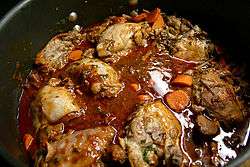Coq au vin
 | |
| Type | Braised |
|---|---|
| Place of origin | France |
| Main ingredients | chicken, wine, lardons, mushrooms, optionally garlic |
|
| |

Coq au vin (/ˌkoʊk oʊ ˈvæn/; French pronunciation: [kɔk o vɛ̃], "rooster/cock with wine") is a French dish of chicken braised with wine, lardons, mushrooms, and optionally garlic. A red Burgundy wine is typically used,[1] though many regions of France make variants using local varietals, such as coq au vin jaune (Jura), coq au Riesling (Alsace), coq au pourpre or coq au violet (Beaujolais nouveau), coq au Champagne, etc.
History
Various legends trace coq au vin to ancient Gaul and Julius Caesar, but the recipe was not documented until the early 20th century;[2] it is generally accepted that it existed as a rustic dish long before that.[1] A somewhat similar recipe, poulet au vin blanc, appeared in an 1864 cookbook.[3]
Julia Child featured coq au vin in her breakthrough 1961 cookbook Mastering the Art of French Cooking, and she frequently prepared it on the PBS cooking show The French Chef. This exposure helped to increase the visibility and popularity of the dish in the United States, and coq au vin was seen as one of Child's signature dishes.[4]
Preparation
Although the word "coq" in French means "rooster" or "cock", and tough birds with lots of connective tissue benefit from braising, most modern coq au vin recipes simply call for commercially produced chicken which may be male or female. For a more authentic experience one should find a local farmer who raises Freedom Ranger (chicken). These are a slower growing chicken, raised primarily on pasture yielding a meat flavor and texture profile reminiscent of heritage French cooking.
Standard recipes call for red wine (often Burgundy) for braising, lardons (salt pork or bacon), button mushrooms, onions, often garlic, and sometimes brandy. Recipes with vin jaune may specify morels instead of white mushrooms. The preparation is similar in many respects to beef bourguignon. The chicken is seasoned, sometimes floured, seared in fat and slowly simmered in wine until tender.[5][6][7] The usual seasonings are salt, pepper, thyme, parsley and bay leaf, usually in the form of a bouquet garni. The juices are thickened either with a roux or by adding blood at the end.[8]
See also
Notes
- 1 2 Oxford Companion to Food, s.v. cock
- ↑ Edmond Richardin, ed., La cuisine française: l'art du bien manger (Ed. rev. et augm.) Paris, 1906, p.227
- ↑ Cookery for English Households, by a French Lady, for English Households&pg=PA93 p.93
- ↑ Shaylyn Esposito, http://www.smithsonian.com, August 15, 2012, "What 9 Famous Chefs and Food Writers Are Cooking to Honor Julia Child’s 100th Birthday."
- ↑ http://www.foodnetwork.com/recipes/ina-garten/coq-au-vin-recipe4.html
- ↑ http://www.foodnetwork.com/recipes/alton-brown/coq-au-vin-recipe.html
- ↑ http://www.epicurious.com/recipes/food/views/coq-au-vin-51133420
- ↑ Harold McGee, On Food and Cooking: The Science and Lore of the Kitchen, 2007, ISBN 1416556370, p. 604
External links
| Wikimedia Commons has media related to Coq au vin. |
| Wikibooks Cookbook has a recipe/module on |
| Look up coq au vin in Wiktionary, the free dictionary. |